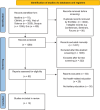Artificial Intelligence in Health Education and Practice: A Systematic Review of Health Students' and Academics' Knowledge, Perceptions and Experiences
- PMID: 40545441
- PMCID: PMC12183008
- DOI: 10.1111/inr.70045
Artificial Intelligence in Health Education and Practice: A Systematic Review of Health Students' and Academics' Knowledge, Perceptions and Experiences
Abstract
Background/objective: Artificial intelligence (AI) is embedded in healthcare education and practice. Pre-service training on AI technologies allows health professionals to identify the best use of AI. This systematic review explores health students'/academics' perception of using AI in their practice. The authors aimed to identify any gaps in the health curriculum related to AI training that may need to be addressed.
Methods: Medline (EBSCO), Web of Science, CINAHL (EBSCO), ERIC, Google Scholar, and Scopus were searched using key terms including health students, health academics, AI, and higher education. Quantitative and qualitative studies published in the last seven years were reviewed. JBI SUMARI was used to facilitate study selection, data extraction, and quality assessment of included articles. Thematic and descriptive data analyses were used to retrieve data. This systematic review has been registered in PROSPERO (CRD42023448005).
Results: Twelve studies, including seven quantitative and five mixed-method studies, provided novel insights into health students' perceptions of using AI in health education or practice. Quantitative findings reported significant variations in attitudes and literacy levels regarding AI across different disciplines and demographics. Senior students and those with doctoral degrees exhibited more favourable outlooks compared with their less experienced counterparts (p < 0.001). Students intending to pursue careers in research demonstrated greater optimism towards AI adoption than those planning to work in clinical practice (p < 0.001). A review of qualitative data, particularly on nursing discipline, revealed four themes, including limited AI literacy, replacement of health specialties with AI vs. providing support, optimism vs. cautiousness about using AI in practice, and ethical concerns. Only one study explored health academics' experiences with AI in education, highlighting a gap in the current literature. This is while that students consistently agreed that universities are the best setting for learning about AI technologies in healthcare highlighting the need for embedding AI training into the health curricula to prepare future healthcare professionals.
Conclusion and implications for nursing/health policy: This systematic review recommends embedding AI training in health curriculum, offering direction for health education providers and curriculum developers responsible for preparing next-generation healthcare professionals, particularly nurses. Ethical considerations and the future role of AI in healthcare practice remain central concerns to be addressed in both curriculum development and future research. Further research is required to address the implication and cost-effectiveness of embedding AI training into health curricula.
Keywords: artificial intelligence; health academics; health students; higher education.
© 2025 The Author(s). International Nursing Review published by John Wiley & Sons Ltd on behalf of International Council of Nurses.
Conflict of interest statement
The authors declare that they have no known competing financial interests or personal relationships that could have appeared to influence the work reported in this paper.
Figures
References
-
- Abichandani, P. , Iaboni C., Lobo D., and Kelly T.. 2023. “Artificial Intelligence and Computer Vision Education: Codifying Student Learning Gains and Attitudes.” Computers and Education: Artificial Intelligence 5: 100159.
-
- Al Saad, M. M. , Shehadeh A., Alanazi S., et al. 2022. “Medical Students' Knowledge and Attitude towards Artificial Intelligence: An Online Survey.” The Open Public Health Journal 15, no. 1:.
Publication types
MeSH terms
LinkOut - more resources
Full Text Sources
Miscellaneous


